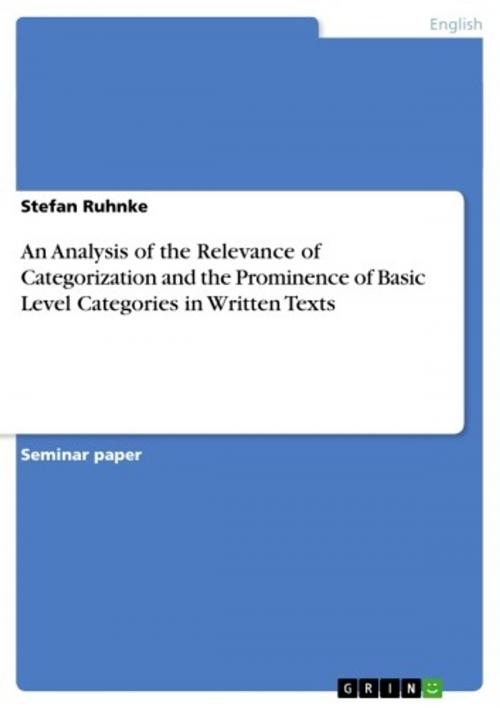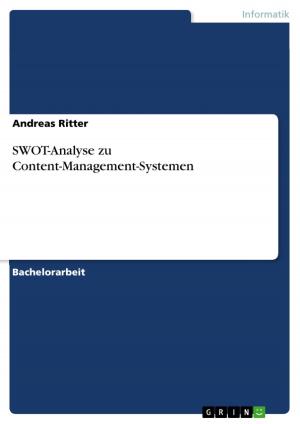An Analysis of the Relevance of Categorization and the Prominence of Basic Level Categories in Written Texts
Nonfiction, Entertainment, Drama, Anthologies| Author: | Stefan Ruhnke | ISBN: | 9783638712996 |
| Publisher: | GRIN Publishing | Publication: | May 22, 2007 |
| Imprint: | GRIN Publishing | Language: | English |
| Author: | Stefan Ruhnke |
| ISBN: | 9783638712996 |
| Publisher: | GRIN Publishing |
| Publication: | May 22, 2007 |
| Imprint: | GRIN Publishing |
| Language: | English |
Seminar paper from the year 2005 in the subject English Language and Literature Studies - Linguistics, grade: 2,3, Ernst Moritz Arndt University of Greifswald (Institut für Anglistik / Amerikanistik), course: Discursive Linguistics, 6 Literaturquellen entries in the bibliography, language: English, abstract: In this seminar paper I want to explain what categorization is and I also want to point out the importance of basic level categories for this process. The chapters dealing with these issues are meant to lay the theoretical basis for this seminar paper. In the other chapters I intend to discuss the results that a research project developed by Prof. Dr. Amei Koll-Stobbe yielded. As it was a project that was based on texts written by several informants, the discussion of the results will often refer to the texts which are attached to the paper. The hypothesis here is then that we can also show the existence and relevance of categories in written texts. Several aspects that linguists regard as relevant for the topic of categorization will be examined using the data of the research project as a basis. The most important aspect will be how the basic level category influences language use. Other aspects will be discussed in the analysis of the texts in the fourth chapter because it might be useful to illustrate several aspects of lesser importance using the informants' texts. It also needs to be mentioned that the corpus of data that has been collected is comparatively small (texts from 12 informants) and that therefore limits regarding the value of the analysis of the data must be considered. Some aspects that might be interesting for categorization processes cannot be examined due to the limited number of informants, at all. Nevertheless, it will hopefully be possible to draw some general conclusions about the use of categories and the special cognitive and linguistic prominence of basic level categories.
Seminar paper from the year 2005 in the subject English Language and Literature Studies - Linguistics, grade: 2,3, Ernst Moritz Arndt University of Greifswald (Institut für Anglistik / Amerikanistik), course: Discursive Linguistics, 6 Literaturquellen entries in the bibliography, language: English, abstract: In this seminar paper I want to explain what categorization is and I also want to point out the importance of basic level categories for this process. The chapters dealing with these issues are meant to lay the theoretical basis for this seminar paper. In the other chapters I intend to discuss the results that a research project developed by Prof. Dr. Amei Koll-Stobbe yielded. As it was a project that was based on texts written by several informants, the discussion of the results will often refer to the texts which are attached to the paper. The hypothesis here is then that we can also show the existence and relevance of categories in written texts. Several aspects that linguists regard as relevant for the topic of categorization will be examined using the data of the research project as a basis. The most important aspect will be how the basic level category influences language use. Other aspects will be discussed in the analysis of the texts in the fourth chapter because it might be useful to illustrate several aspects of lesser importance using the informants' texts. It also needs to be mentioned that the corpus of data that has been collected is comparatively small (texts from 12 informants) and that therefore limits regarding the value of the analysis of the data must be considered. Some aspects that might be interesting for categorization processes cannot be examined due to the limited number of informants, at all. Nevertheless, it will hopefully be possible to draw some general conclusions about the use of categories and the special cognitive and linguistic prominence of basic level categories.















